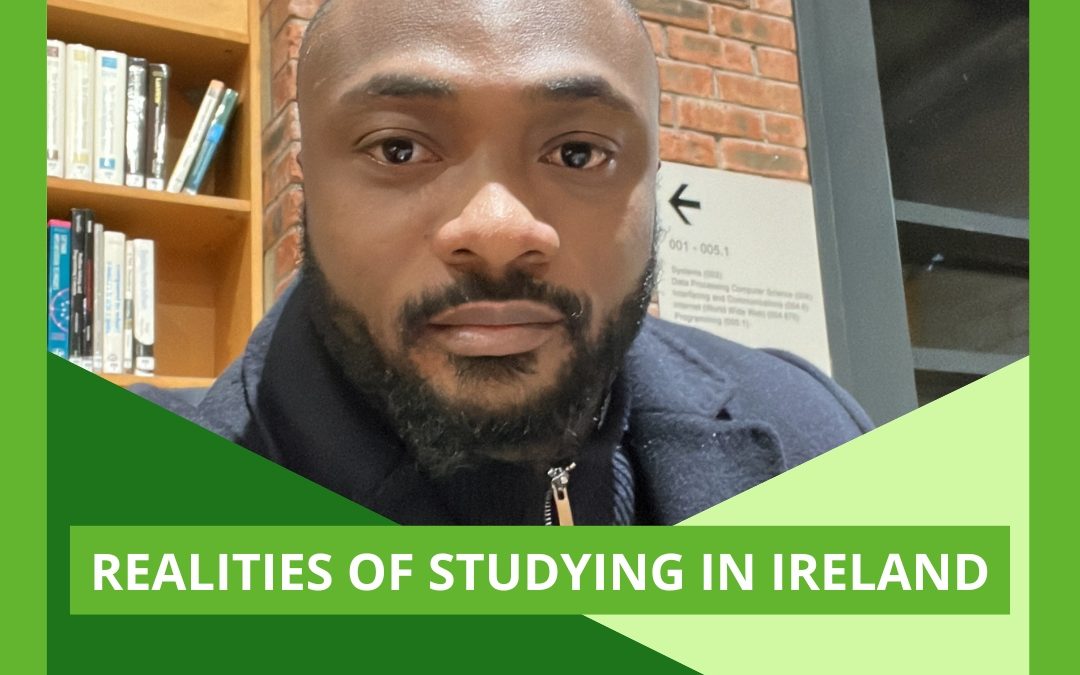Our Student Ambassador, Chiebuka Christopher, shares the unfiltered truth about studying in Ireland: a journey of challenges, growth, and unforgettable experiences!
Like many of my fellow Nigerians, I grew up mesmerized by the alluring images and stories of life in Ireland shared on social media and through enthusiastic phone conversations, particularly with my friend Tony, who lives in Cork and is studying at MTU. These depictions painted a life of ease and luxury, a veritable bed of roses. However, having lived the reality, I feel compelled to share the hard truth about studying in Ireland – it’s far from the fantasy many of us harbor. Let’s dive into the ‘Realities of Studying in Ireland: Beyond the Emerald Dream.’
Firstly, you have to be financially prepared; little wonder the emphasis on financial stability in the visa requirements isn’t for naught. I was fortunate to receive the Irish government scholarship and had family support upon arrival for accommodation, but don’t be mistaken – this isn’t the norm, it was effectively planned. My classmates in Nigeria often fantasize about juggling part-time work with their studies. But with packed schedules and a strict 20-hour work limit per week in Ireland, the reality is that most students barely earn enough to cover their basic expenses, while some haven’t gotten any part-time job yet due to the PPS number and Irish Resident Permit (IRP) requirements. This was starkly highlighted during a candid chat with my friend Tony, whose social media exuded ease and luxury. His revelation – ‘all na packaging’ (it’s all just a show) – was a sobering reminder of the gap between perception and reality. Hmm! My consolation remained the fact that I won a scholarship and had planned my finances and accommodation properly before arriving in Ireland.
So, what about when the pressure sets in at school? This brings me to my second point. The academic rigor here in Ireland is no joke. A point comes each semester when assignments, assessments, presentations, and exams pile up. Most of my classmates broke down, and some found themselves having to reschedule or even temporarily quit their jobs to cope with this intense period (meanwhile, I had no part-time job). For me, I prefer studying at night, so I usually stay up until around 6 a.m. to meet deadlines (mind you, your approach could be different). It’s a stark reminder that our primary goal in Ireland is education, and it demands stretching beyond our comfort zones.
Thirdly, like they say, with cultural diversity comes culture shock. So, brace yourself for an array of culture shocks. What’s normal back home can be perceived differently here. For instance, a simple text I sent to a friend asking, ‘I hope you have eaten?’ was met with silence and later, a light-hearted remark about its oddity in their culture. These experiences teach you to be observant and respectful of the new cultural environment you find yourself in. Engaging with the local ways, asking polite questions, and avoiding assumptions are crucial to smoothly navigating this diverse environment. Trust me, culture shock is inevitable, so you’ve got to be open-minded.
On the flip side, studying in Ireland, especially in Cork, Europe’s second-friendliest city, offers a unique chance to embrace cultural diversity. You’ll meet people from around the globe, learning about various cultures, cuisines, languages, and histories. For example, while I learned Chinese recipes from Hangyu and Qiyu, I taught them how to make Jollof rice. Celebrating Diwali with Indian students also broadened my understanding of their traditions. I must tell you that my closest friends are not Nigerians (lol).
Additionally, in Ireland’s challenging academic environment, a wealth of opportunities, including internships and job placements with leading companies like Microsoft, Google, Dell, and Amazon, complements rigorous coursework. Overcoming these academic hurdles not only deepens knowledge but also offers practical insights into various professions.
My advice: Financial readiness and securing accommodation early are essential for studying in Ireland. Don’t fall for the misconception that earning money is easy while studying. With the high cost of living, tuition, and personal expenses, careful budgeting is key—consider applying for scholarships. Part-time work can supplement income but shouldn’t be your main financial plan. Focus primarily on your studies.
Studying in Ireland is rewarding but challenging. Expect moments of doubt, homesickness, and stress. Recognize these issues and seek healthy coping mechanisms. Irish universities provide robust student support services, like counseling and clubs, to help you navigate these challenges.
Therefore, dear friends, as you embark on this journey, shed any preconceived notions and embrace the real Ireland – with all its challenges and charms.”
Chiebuka Christopher is studying at MTU via Education in Ireland.

